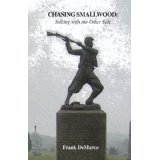
Chasing Smallwood
[A book with four interlocking themes:
- how to communicate with the dead;
- the life of a 19th-century American;
- the massive task facing us today, and
- the physical world’s place in the scheme of things.]
.20. The Question of Trust
The question of verification bothered me more than ever after my session with psychic (and psychotherapist) Karen Storsteen on December 29, has described here in Chasing Smallwood — 15. I know that people think that psychic investigators are willing to believe anything and everything, and are so eager to connect that they fooled themselves routinely, never doubting that whatever they fantasize is true. No doubt some people are like that, but I am not. If anything, my need for verification has often stood in the way of obtaining the experience that would eventually provide the verification. Clutching in the face of uncertainty often has the effect of stepping on the air hose, cutting off the flow. One doesn’t want to be a fool; one doesn’t want to cut off the flow. It makes for a delicate, often uncomfortable balance.
Friday, December 30, 2005
I feel particularly down and out this morning. Last night’s session with Karen seems to say that much of what I thought I know knew about Joseph isn’t so — and much that he said isn’t so. Damn it, I’m tired of cat and mouse!
Very depressed; no way to end an old year.
Alright gentlemen, I guess I’ve been putting this off. As Bruce Moen says, trust is always the issue. You know what is bothering me. Why in 18 years have I been unable to find one shred of physical evidence to support any of the stories I’ve been given or have fabricated?
The validations have all been internal, and they have changed you. But you wish something external and have not gotten it. How much effort have you made to obtain it?
Every lead that I have been given has come up negative. Don’t tell me that it is my fault that I — faithfully recording Smallwood’s stories — have been unable to find him where he now says he is not.
You know as well as I that I do not need a tenth — a percent — of one scholar would need as evidence. I, knowing that I am not perpetuating a hoax, need not prove that I am not doing so. Therefore all I need is some concrete thing — a historical record, a book, something — to say “here you are, as promised.” Instead I get nothing.
And do not tell me that this is so I can tell others of the difficulties in the path. Fine! I’ve had 18 years of it, some of it in public. There is enough already on the record to demonstrate the point. Now I want something concrete.
You have the Army records to be found.
Maybe. And maybe no David Joseph Smallwood is to be found there. To this point I don’t have one slightest point to lean on, and I’m getting mighty tired of it.
And another thing — those stories from Smallwood. They seemed real enough. They were just stories, apparently. I notice they stopped dead when it came time to look at facts that could be checked.
I don’t know why I bother with this, and I don’t know what to do. I have so much of my being tied up in the into this. My god what will I do?
Trust. You live in trust. Keep living in trust, and all will be seen as well. It is well; it will be seen to be well.
Yes, well — what is your answer to my question? Why have I been unable to find evidence?
We answered the question. You haven’t really looked. Your efforts have been halfhearted and cursory. You have not even made up sheets of information to check! Never have thought of doing it, or of asking us how.
Say that’s true. Why can’t you just give me where to find a thing? “Yeats” gave me the publisher of David’s book, but no trace, no idea how or where to find it, or even if it exists.
This is so helpful to me! I have felt the same sort of frustration, even after having clear, very moving experiences that resonated. They wouldn’t check out (e.g., who I was talking to, or Civil War era related things). Once, a friend who channels (she’s chair of the Sociology department at a university not far from you, but closeted about this) gave me a name for a past life of mine, and I actually found the person (Henry Carey, economist, 1793-1879). This was unsettling and of course raised more questions. Just because I had verification this person existed, had I really “been” him? But I did feel something when I looked at his face, and I seemed to know other things about him. And I think that’s where I’ve come to rest–that everything ends up relying on our own intuitive feel for whatever it is. That’s what I have to trust. As your source said, “The validations have all been internal, and they have changed you.” As Seth said, “all progress made is permanent progress.” Thanks for your honesty!
In later years, I have come to the conclusion (well, been told, and more than onces) that we can’t know whether a strong resonance is an indicator of a “past life” or a sign that we and they share some strong element in our makeup. And, for all practical purposes, it doesn’t make any difference. It’s one of those things I call useless questions, because they cannot be resolved and, even if they could, would make no practical difference.
“Thanks for your honesty!” That’s what I mainly have to offer. Thanks for the acknowledgement.